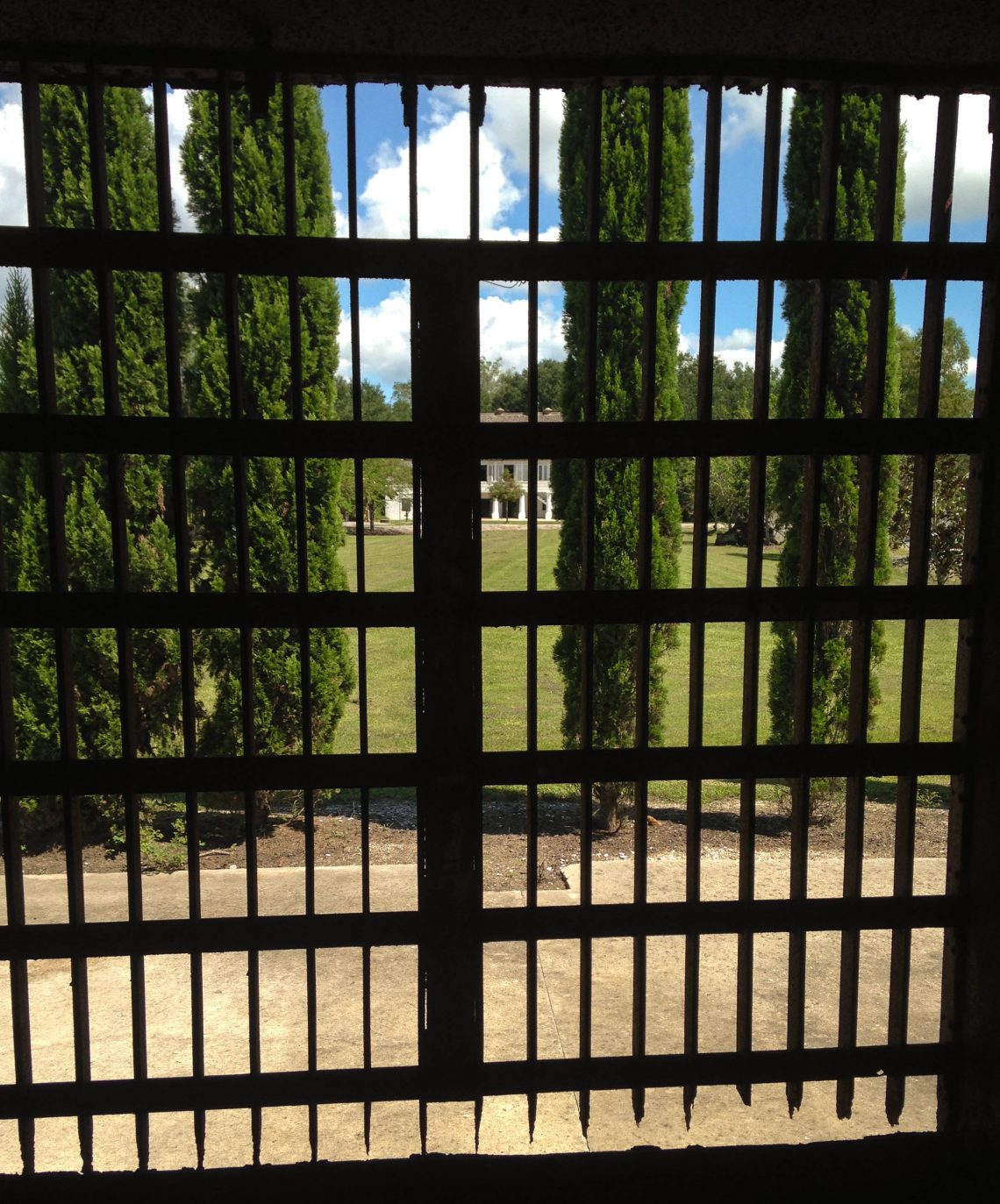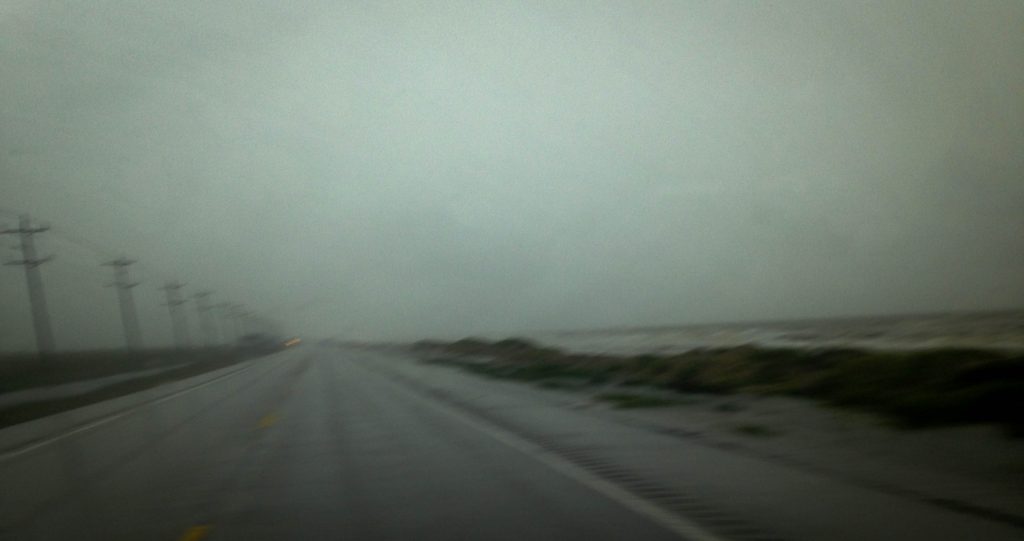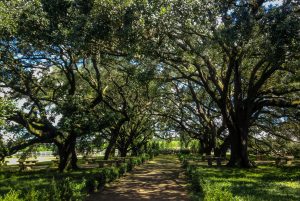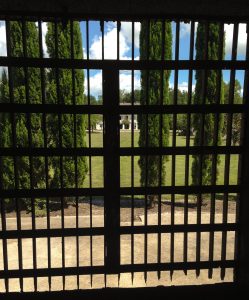
Discomfort
Overwhelming humidity, the rural South, and a hurricane.
I have experienced all three of these before, but always from a place of ease and safety, where I could step out, stick a toe in, say ‘oh gee’ and retreat into shelter, pronto. And, to be fair, I haven’t had to deal with all three at the same time. Yesterday morning I fled from my backroad parking lot in the Cajun Country of Louisiana for the air conditioned McDonald’s by the interstate to make a post, and found that the server for this site, in Virginia, was not available because Hurricane Florence was hitting land. And that was only the final straw.
It was impossible for me to sleep in Janet two nights ago in Galveston. I kept her top down because of rain, and her windows mostly closed because of mosquitoes and safety, and it was stifling. At a little after midnight, I got the code Dick had given me, and crept in to the dark ‘day room’ of the RV park and lay down on one of the couches. The air-conditioning was blissful, but I curled up in a swirl of thoughts about a) the utter, contemptible softness of Americans, b) how much mental strength I really have at my disposal, if I will use it, and c) how many millions of air conditioners are blasting away at this very moment, making lots of noise and sucking up mountain tops inch by inch.
 The next day we journeyed up the Bolivar Peninsula in high wind and rain. Had it been a real hurricane, it would have sent my tippy little box flat over on her side, but Janet was only bounced about all morning. In this part of the world, many of the houses are on stilts, and here they were even higher than usual.
The next day we journeyed up the Bolivar Peninsula in high wind and rain. Had it been a real hurricane, it would have sent my tippy little box flat over on her side, but Janet was only bounced about all morning. In this part of the world, many of the houses are on stilts, and here they were even higher than usual.
By the time we entered the causeway over Louisiana’s Atchafalaya Swamp, the weather had lightened, and I chose a little winding road to explore going south of the village of Grosse Tete. I was delighted with all the French names, and my first view of live oaks and Spanish moss. Eventually I thought I might find something to eat in one of the little towns, maybe some local, homespun Cajun food. Searching for a simple cafe, I crossed some railroad tracks, to look in that part of town, and got a look from a black woman walking on the edge of the street that told me that I was not at all a welcome sight. I was going to have to find out about the mysterious laws that tell people of different racial appearances where they must or mustn’t go. The fact is, that’s sadly much easier than finding good food in the rural United States.
The, yes, white deputy parish sheriff at a gas station granted me permission to park there for the night. Later I sat and stared at the gravel, with Janet’s door open. My years living in Harlem, the very relaxed and happy demeanor of the Hispanic and black San Antonians and west Texans I had talked with, all felt a million miles away. This was different.
In the morning, it was too hot to make coffee in Janet, so I went into the gas station and told the cold and unfriendly, and yes, black woman at the counter that I would be back for at least two more refills, so, did I have to pay for them, and how much? She was nonplussed, then said 92 cents. After I drank the first one, I thought, I’m not going to be intimidated by this, this is silly. I went back in, with four quarters and two pennies, and asked her about the music that was piped out over the whole parking area. It was not the ‘black’ music I always heard on the west coast, it was melodic and vulnerable. When I came in the third time, she said ‘You drove here from Oregon by yourself?’ I said yes, and she told me quietly there’d be no charge for that third cup. I thanked her kindly, and she kindly responded. I needed a decent human interaction, and there was one to be had. Despair tempts me sometimes, but it didn’t win. Moving on.
But first, I had to go find real air conditioning, because the clouds were dispersing, and the heat and humidity was, frankly, too much. I was reaching the limits of my ability to stay in continual physical and mental motion.
 After McDonald’s, I headed out for the river road, to look at some plantations. This country is all sugar cane, with an oil refinery or a fertilizer plant to break up the very flat horizon. Or a tall, tall bridge over the Mississippi, shooting the highway way up and over any ship that may pass through. A levee lines the bank, so you can’t see the river from the road, nor feel its breezes any more. All the old plantation houses have formal drives that lead toward the river, but end up facing this sinuous green berm of mown grass.
After McDonald’s, I headed out for the river road, to look at some plantations. This country is all sugar cane, with an oil refinery or a fertilizer plant to break up the very flat horizon. Or a tall, tall bridge over the Mississippi, shooting the highway way up and over any ship that may pass through. A levee lines the bank, so you can’t see the river from the road, nor feel its breezes any more. All the old plantation houses have formal drives that lead toward the river, but end up facing this sinuous green berm of mown grass.
The Whitney Plantation shows plantation life from the slave perspective, which I appreciated since I learned at Monticello in 2011 that it can be still, rather perplexingly, ignored. But touring it in this heat brought the conditions home to me. When I looked into the iron holding box they had brought in to display, that was used to hold people until auction, I thought of trying to sleep in Janet for one night without a breeze or air conditioning, and how I felt like I could lose my mind. And I’m sure some of the people in those things pretty much did. 
The comments in the center often expressed appreciation for being made aware of the facts that are presented in the tour. That was my biggest surprise of the day. How do people not know? Do they live in that airtight of a bubble?
But I didn’t tell you about backing Janet into a concrete light pole base during my frustrating forays in search of air conditioning. I had to get…to…relief…and didn’t take the time to look behind me well enough. Now she has a little dent and a scuffed bumper, and I am heartbroken and being really, really hard on myself.
It’s ok, Simone. It really is. I didn’t look out for her, and yet she’s only an inanimate object, so why I am tearing up right now?

